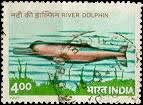- Shivani Thakur
Dolphins conjure up an image contrary to other mammal species. They have been known to help people in distress. The stories of saving a many from drowning and bringing back to shores are among them. Their intelligence is one of the factors
for their use by US marines in wars. Also they are being used for programs designed for disabled people. Their patience with human beings has resulted in success of such programes. Very few people are aware that dolphins are not only found in seas and oceans
but also in rivers. In the world there are only four river systems, which have fresh water dolphins. The Ganga River is one of the systems. Platanista gangetica is the name by which it is known. In the local language they are also known as ‘shushuks.’
 These giant mammals survive on fish and planktons. A study conducted in 2004 by Patna University’s R.K.Sinha, - who is also a member of IUCN- puts the sightings of Gangetic dolphins at 473. According to him it is difficult to trace
the dolphins in the summer but in winter’s upstream survey, in over 500km stretch from Manihari (bordering West Bengal to Buxar bordering UP, the total sightings reached 777. But, now these mammals have been put under Red List of Threatened Mammals by IUCN.
Dolphins are decreasing day by day because of rampant poaching and loss of their habitat. Poisoning of water systems from industrial and agricultural chemicals has resulted in decline of fish as well as planktons, which are the main diet of dolphins. The toxicity
of the river has also resulted in decline in their population. Their breeding patterns have been affected.
These giant mammals survive on fish and planktons. A study conducted in 2004 by Patna University’s R.K.Sinha, - who is also a member of IUCN- puts the sightings of Gangetic dolphins at 473. According to him it is difficult to trace
the dolphins in the summer but in winter’s upstream survey, in over 500km stretch from Manihari (bordering West Bengal to Buxar bordering UP, the total sightings reached 777. But, now these mammals have been put under Red List of Threatened Mammals by IUCN.
Dolphins are decreasing day by day because of rampant poaching and loss of their habitat. Poisoning of water systems from industrial and agricultural chemicals has resulted in decline of fish as well as planktons, which are the main diet of dolphins. The toxicity
of the river has also resulted in decline in their population. Their breeding patterns have been affected.
The dolphins are also hunted for their meat and oil. The meat usually ends up as an exotic dish for tourists. Since it is found in fresh waters it is consumed as any other local fish. The oil extracted from them is used as liniment,
as an aphrodisiac. The oil is also used as bait for catfish. The dolphins also get caught in nets meant for other fish. Due to all this R.K.Sinha has come up with a viable solution for the oil. According to him, fish scraps can be used as substitutes for dolphin
oils that fishermen use for catching bakus or sukwa and bacha fish. The scraps are made of peritoneal extracts of three species rohu, katla and cirrhinus mrigale. These scraps will improve the catch and in turn save the Gangetic dolphins from being poached.
Recently, a 45 km stretch of the Ganga from Garhmukteshwar to Narora was declared as Ramsar site. This will make the wetland species as protected as the tiger. The forest department will patrol this site and any activity against the
local fauna will be made a punishable act under the Wildlife Act. Tall and well equipped watch towers will also be set up where dolphins are mostly seen. Also, the Ganga tends to meander and flows over shallow areas. This will be prevented by setting up crate
wire spurs containing stones or various vegetation to act like dams on the sides of the river and will act like a natural boundary.
The Gangetic Dolphin is still an unknown creature to most of us. Their gentle nature is also a bane for them but so is ignorance about them. It is easier to save man-made structures but it is impossible to save a species. And our dolphins
have been in existence from the time of King Bhagirath according to legends. They were given the task to protect the river Ganga by Lord Shiva. Thus, they are part of our culture, and heritage and their protection should be our duty.
( The stamp in picture was issued in 1991).